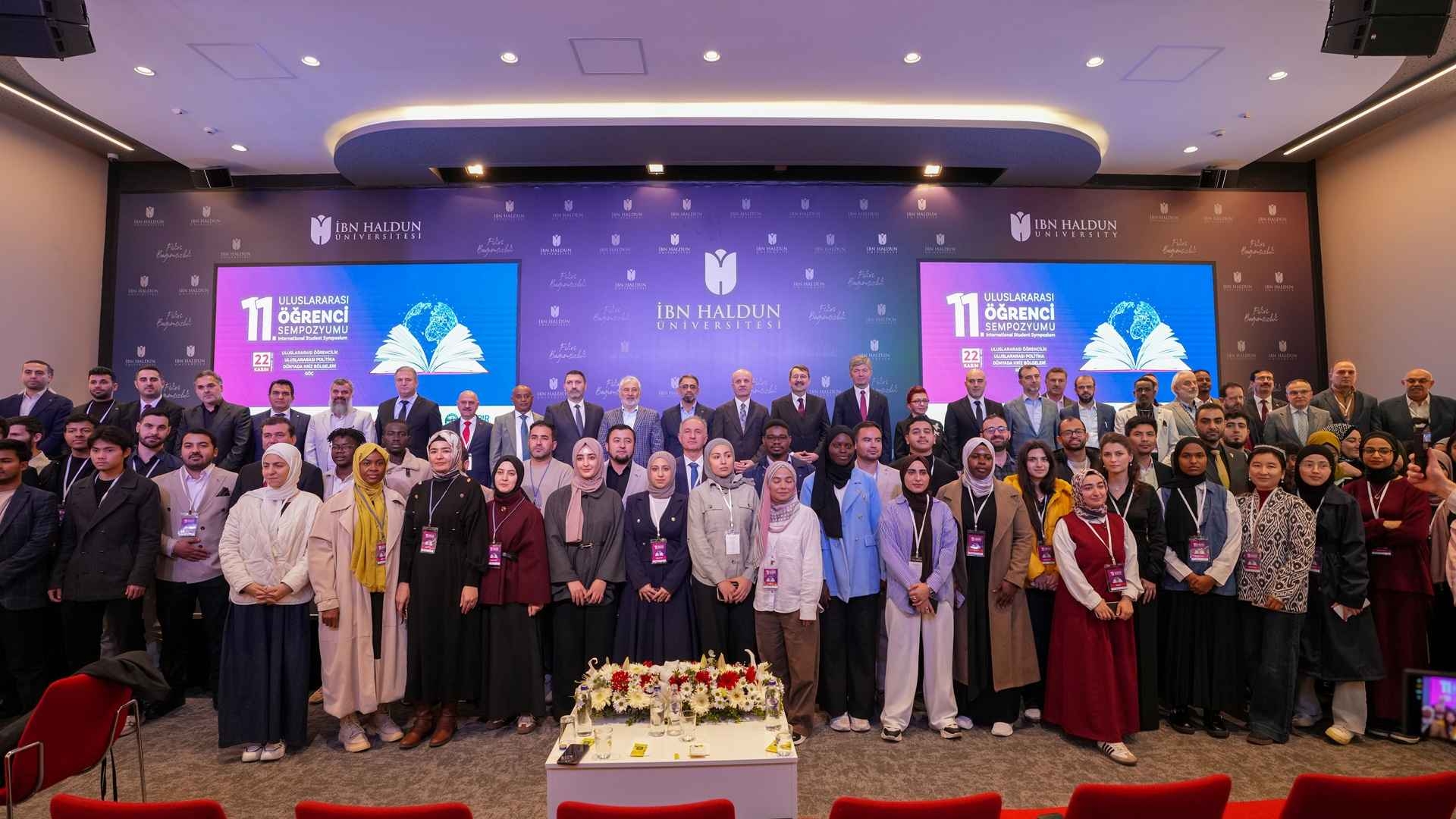


November 22, organized under the leadership of the Federation of International Student Associations. The symposium, which aims to support the academic development of international students studying in Türkiye and to develop solution-oriented approaches to the challenges they face during their educational journeys, featured sessions on “International Studenthood,” “International Politics,” “Migration,” and “Crisis Regions Around the World.” The symposium received partnership support from the Union of Academics and Authors of Islamic Countries, International University of Sarajevo, Raya University of Ethiopia, International Islamic University Malaysia, and the Presidency for Turks Abroad and Related Communities.
Speaking at the opening of the symposium, the President of the Council of Higher Education (YÖK), Prof. Erol Özvar, emphasized that the suspension of students who show solidarity with Palestine and the dismissal of academics around the world have raised serious concerns regarding academic freedom. He stated that Türkiye, in line with its historical stance, stands firmly with the oppressed in this process. He highlighted that, under the leadership of President Recep Tayyip Erdoğan, Turkish universities have opened their doors to Palestinian students and academics, as well as to all those who have taken an honorable and courageous stand on Gaza and faced pressure, providing young people from Gaza with access to free education. Prof. Özvar noted that higher education is undergoing rapid transformation on a global scale, with universities becoming institutions that not only produce knowledge but also transfer it to society, develop international collaborations, and expand their impact through social responsibility initiatives. He reported that Türkiye now hosts approximately 360,000 international students from 198 countries, ranking 6th worldwide, and expressed the goal of increasing this number to 500,000 in the medium term and 1 million in the long term. Underscoring that the friendships international students build in Türkiye will evolve into lasting bridges of goodwill between nations in the future, Prof. Özvar also announced a new regulation granting international graduates the right to one year of legal residence after completing their studies.
In his speech, İbn Haldun University Rector Prof. Atilla Arkan emphasized that international students serve as a “guiding star,” contributing to the development of mutual understanding between nations and civilizations. He noted that İbn Haldun University brings together students from more than 80 countries, offering significant cultural richness with its 32% international student ratio. Prof. Arkan stated that studying abroad is an experience that transforms individuals into people with “broad minds and open hearts,” and highlighted that such diversity is one of the most valuable opportunities in a student's life. Drawing on his own life experiences in countries such as Qatar, Malaysia, and Syria, he underlined that interaction with different cultures is profoundly horizon-expanding.
UDEF President Abdullah Muhammed Islam emphasized that despite all the communication tools brought by globalization and digitalization, nothing can replace the direct interaction formed through close human contact. He stated that UDEF’s sincere relationship with international students across Türkiye for nearly twenty years clearly demonstrates this truth. Muhammed Islam noted that with 61 associations in 58 cities and additional structures in Cyprus, UDEF not only provides support to international students but also strives to build a foundation that contributes to the reconstruction of universal values such as justice, compassion, and conscience. He added that graduates who study in Türkiye and return to their home countries now play active roles across various fields—from public institutions to civil society and the business world. Islam described the impact of these efforts by saying, “We witness its blessings everywhere we go.”
Assoc. Prof. Ebubekir Ceylan, Chairman of the Board of Directors of the Academicians and Writers Union of Islamic Countries (AYBİR), emphasized that today's higher education institutions are not merely structures that produce knowledge, but have also become global actors at the heart of internationalization. In this context, he stated that international students enrich the intellectual diversity of universities and deepen the academic environment by introducing different perspectives. Assoc. Prof. Ceylan mentioned that a significant part of AYBİR's recent work has focused on Gaza and Syria. He spoke about their reports addressing the restrictions on academic freedom in Western universities in the context of the genocide in Gaza, and their studies evaluating the stance of the culture and arts community on Gaza. He also reported that they prepared a report analyzing the current state of higher education in Syria. Finally, Ceylan touched upon the "First Lecture Palestine" campaign held at the opening of this academic year, and expressed his gratitude for the support given to the President of YÖK (Council of Higher Education).
In the continuation of the opening speeches: Tadesse Dejenie, Rector of Raya University in Ethiopia, stated that a strong mindset is crucial for the academic and personal development of international students, emphasizing the importance of resilience, self-confidence, and adaptability. Prof.Osman Bakar, Rector of the International Islamic University of Malaysia, sent a written message appreciating UDEF's work for international students in Türkiye and expressing his belief that the symposium would make significant contributions to the relevant fields. Prof. Ali Osman Kuşakçı, Rector of the International University of Sarajevo, expressed their satisfaction with being a stakeholder in the event and highlighted the importance of academic cooperation in his message. Okan Leblebici, Deputy Governor of Istanbul, drew attention to the value international students add to Türkiye and their potential to strengthen relations when they return to their home countries.
In addition to academic discussions, the symposium provided concrete contributions to Türkiye's international student vision by fostering a global interaction environment, strengthening the sharing of knowledge and experience among students from different countries.